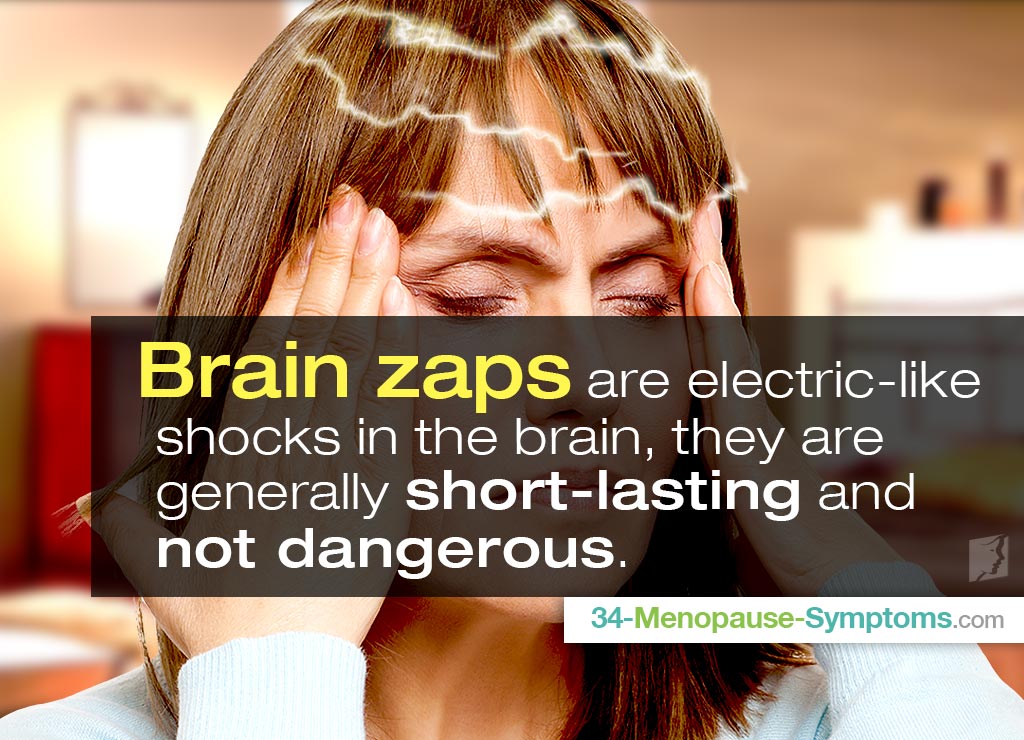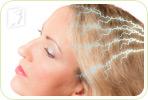All our functions are controlled by the electrical system in our body, with the brain being the center of control. Neurons generate billions of electrical impulses, enabling our movement, digestion, cognition, and everything else than makes as human.
Sometimes, however, these electrical impulses seem to misfire, causing a sensation of electric-like shocks in the brain, called brain zaps. Their causes are mostly unknown, but often relate to hormonal imbalance during menopause. Continue reading to learn what brain zaps are, what causes them, and how to treat this unpleasant symptom.
Recognizing Brain Zaps
Most women describe brain zaps, also known as brain shivers or head shocks, as a repetitive electric-like sensation in the head. They often originate at the base of the skull and spreading on the back of the head and neck. Sometimes brain zaps are also accompanied by dizziness, pain, or tinnitus, a ringing in the ears. They usually last for a brief moment, and their frequency and strength vary from woman to woman.
When Should I Be Concerned?
Brain zaps are generally short-lasting and not dangerous. If they occur along with vision disturbances, severe pain, or muscles weakness, they should be properly evaluated to rule out a neurological disorder, such as multiple sclerosis (MS).
Also, many menopausal women experience a wide range of symptoms, such as hot flashes, which are often preceded by brain shivers. If brain zaps occur with other menopausal symptoms and their severity is too overwhelming and interferes with your daily life, talk to you doctor to find an optimal treatment plan for you.
The Causes of Brain Zaps
The occurrence of brain zaps is strongly associated with a discontinuation of several prescription medications used to treat anxiety, depression, and migraines, which are more common in women than in men. Many middle-aged women report brain shocks as a side effect of hormone replacement therapy (HRT), sleeping pills, and anxiety drugs.
Moreover, electric-like shocks in the brain have been linked to the following conditions:
- Hormonal imbalance during menopause
- Persistent stress
- Anxiety
- Alcohol abuse
- Head injury
- Toxic exposure
- Herniated disc
- Spinal stenosis
- Migraine
- Fibromyalgia
- Epilepsy
- Multiple sclerosis
- Occipital neuralgia
- Brain tumor
Treatments for Brain Zaps
The possible treatments for electric shocks in the brain depend on the suspected underlying cause. In many cases, medication change can lessen their occurrence, and there are several dietary changes and alternative therapies that could bring relief to women struggling with brain shivers. They include:
Dietary changes
Complementing your diet with foods that are good sources of omega-3 fatty acids, vitamins B12 and E, magnesium, calcium and potassium can lower the risk of inflammation and improve brain health. Dark chocolate, ginger, soy, and green tea, filled with antioxidants, are another great addition.
Alternative therapies
Practices that reduce stress and anxiety, such as acupuncture or meditation, have shown to be helpful in lessening the occurrence of brain zaps. Regular low-impact exercises, like yoga or even stretching, can relieve your stress and anxiety, thus preventing electric-like shocks in the brain.
Herbal supplements
Numerous herbs, such as black cohosh, red clover, chamomile, can help stabilize the hormonal fluctuations common in menopause and linked to brain zaps. Hormone-regulating supplements can also be effective in reducing brain zaps.
Medication
The electric shocks in the brain are usually treated with hormone regulating therapy (HRT), which might be challenging, since in some women HRT is in fact the cause of brain zaps. This treatment might cause a wide range of side effects, such as breast cancer, so caution is advised.
Brain zaps are poorly understood by science, so it is important not to underestimate them and to make your doctor aware of their occurrence to ensure that they are benign and do not lead signal serious complications. If your brain zaps continue bothering you, you might want to check out some home remedies for menopausal electric shocks.
Sources
- American Academy of Orthopaedic Surgeons. (2016). Carpal Tunnel Syndrome. Retrieved September 11, 2017 from http://orthoinfo.aaos.org/topic.cfm?topic=a00005
- American Family Physician. (2006). Antidepressant Discontinuation Syndrome. Retrieved September 8, 2017 from http://www.aafp.org/afp/2006/0801/p449.html
- Anxietycentre. (2017). Head and Brain Zaps anxiety syndrome. Retrieved September 8, 2017 from http://www.anxietycentre.com/anxiety-symptoms/brain-zaps.shtml
- Blows, W. (2002). The Biological Basis of Mental Health Nursing. Routledge: New York, USA.
- Consumer Health Digest. (n.d.). What are Brain Shivers and How to Cope with It? Retrieved September 8, 2017 from https://www.consumerhealthdigest.com/depression/brain-shivers.html
- Medhealth daily. (2017). What are brain zaps? Retrieved September 8, 2017 from https://www.medhealthdaily.com/what-are-brain-zaps/
- Overcoming Multiple Sclerosis. (2017). What are the symptoms of MS? Retrieved September 11, 2017 from https://overcomingms.org/about-multiple-sclerosis/what-is-ms/what-are-the-symptoms/




